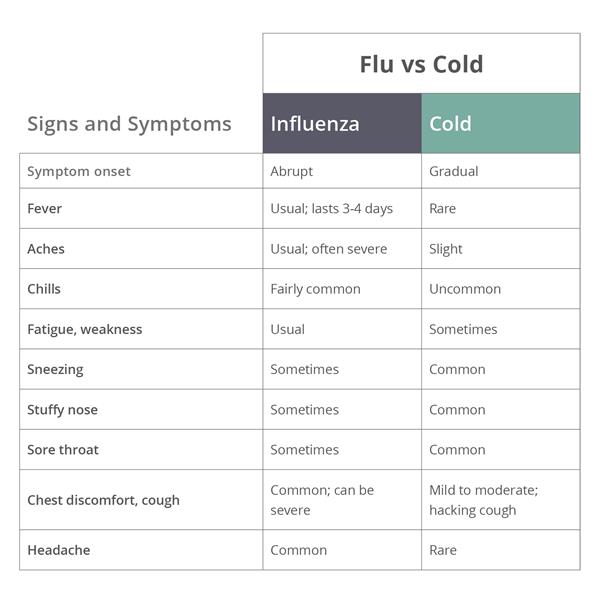About influenza (flu)
The flu is a contagious respiratory illness caused by influenza viruses that infect the nose, throat, and lungs. It can cause mild to severe illness, and at times can lead to death. The best way to prevent the flu is by getting a flu vaccine each year.
Signs and symptoms of flu
People who have the flu often feel some or all of these signs and symptoms:
- Fever* or feeling feverish/chills
- Cough
- Sore throat
- Runny or stuffy nose
- Muscle or body aches
- Headaches
- Fatigue (very tired)
- Some people may have vomiting and diarrhea, though this is more common in children than adults.
*It’s important to note that not everyone with flu will have a fever.
How flu spreads
Most experts believe that flu viruses spread mainly by droplets made when people with flu cough, sneeze or talk. These droplets can land in the mouths or noses of people who are nearby. Less often, a person might also get flu by touching a surface or
object that has flu virus on it and then touching their own mouth, eyes or possibly their nose.
Period of contagiousness
You may be able to pass on the flu to someone else before you know you are sick, as well as while you are sick. Most healthy adults may be able to infect others beginning one day before symptoms develop and up to five to seven days after becoming sick.
Some people, especially young children and people with weakened immune systems, might be able to infect others for an even longer time.
Onset of symptoms
The time from when a person is exposed to the flu virus to when symptoms begin is about one to four days, with an average of about two days.
Flu complications
Most people who get influenza will recover in a few days to less than two weeks, but some people will develop complications (such as pneumonia) as a result of the flu, some of which can be life-threatening and result in death.
Pneumonia, bronchitis, sinus and ear infections are examples of complications from flu. The flu can make chronic health problems worse. For example, people with asthma may experience asthma attacks while they have the flu, and people with chronic congestive
heart failure may experience worsening of this condition that is triggered by the flu.
People at high risk from flu
Anyone can get the flu (even healthy people), and serious problems related to the flu can happen at any age, but some people are at high risk of developing serious flu-related complications if they get sick. This includes people 65 years and older, people
of any age with certain chronic medical conditions (such as asthma, diabetes, or heart disease), pregnant women, and young children.
What are the emergency warning signs of flu sickness?
In children
- Fast breathing or trouble breathing
- Bluish skin color
- Not drinking enough fluids
- Not waking up or not interacting
- Being so irritable that the child does not want to be held
- Flu-like symptoms improve but then return with fever and worse cough
- Fever with a rash
In addition to the signs above, get medical help right away for any infant who has any of these signs:
- Being unable to eat
- Has trouble breathing
- Has no tears when crying
- Significantly fewer wet diapers than normal
In adults
- Difficulty breathing or shortness of breath
- Pain or pressure in the chest or abdomen
- Sudden dizziness
- Confusion
- Severe or persistent vomiting
- Flu-like symptoms that improve but then return with fever and worse cough
How can I tell the difference between the flu and a cold?

What should I do if I get sick?
Most people with the flu have mild illness and do not need medical care or antiviral drugs. If you get sick with flu symptoms, in most cases, you should stay home and avoid contact with other people except to get medical care.
If, however, you have symptoms of flu and are in a high risk group, or are very sick or worried about your illness, contact your health care provider (doctor, physician assistant, etc.).
Certain people are at high risk of serious flu-related complications (including young children, people 65 and older, pregnant women and people with certain medical conditions). This is true both for seasonal flu and novel flu virus infections. If you
are in a high risk group and develop flu symptoms, it’s best for you to contact your doctor early in your illness. Remind them about your high risk status for flu. CDC recommends that people at high risk for complications should get antiviral
treatment as early as possible, because benefit is greatest if treatment is started within two days after illness onset.
Do I need to go the emergency room if I am only a little sick?
No. The emergency room should be used for people who are very sick. You should not go to the emergency room if you are only mildly ill.
If you have the emergency warning signs of flu sickness, you should go to the emergency room. If you get sick with flu symptoms and are at high risk of flu complications or you are concerned about your illness, call your health care provider for advice.
If you go to the emergency room and you are not sick with the flu, you may catch it from people who do have it.